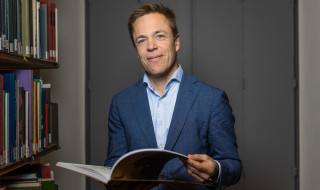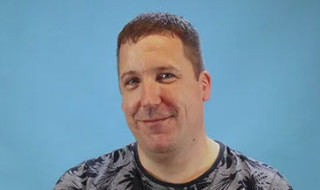Public values under pressure: libraries draw line at licence negotiations
For the first time, libraries in higher education have issued a negative procurement recommendation against a publisher. Not because of the price of the licence, but because the publisher does not have its privacy rules in order. The chairs of the licensing working groups of UKB and SHB explain how they arrived at this decision.

Matthijs van Otegem (Utrecht University Library)
Most people in higher education take it for granted: you click on an article through Google Scholar and it appears on your screen. But this isn’t as straightforward as it seems, explains Matthijs van Otegem, director of Utrecht University Library. "When we switched from paper to digital twenty years ago, we quickly realised it was useful to negotiate licenses collectively with publishers on behalf of all libraries. This ensures everyone has equal access." With this joint approach, libraries ensure that institutions do not enter into licences with publishers that put students and staff in a vulnerable position.
Benefits for both parties

Raymond Snijders (Media centre Windesheim)
Universities of applied sciences were happy to join this setup, says Raymond Snijders, senior information librarian at Windesheim's Media Centre. "As college libraries, we wanted to join forces in contacting publishers." From then on, negotiations were conducted on behalf of the entire higher education sector by library experts, supported by SURF's Content Procurement team.
This approach also benefits publishers. Van Otegem elaborates: "Higher education is where your future customers are. So if as a publisher you manage to get your content into an education, you have a good chance that people will also start using your products in their daily lives and continue to use them after their studies." With SURF's expertise - think of the authentication and authorisation platform SURFconext - the user experience is made as seamless as possible.
Public values in negotiations
However, licensing is about more than money and convenience. Public values are a key issue in negotiations. Privacy, for example: SURFconext enables anonymised attributes. Then the publisher only sees that someone from a certain institution wants access, without revealing who they are.
But not every publisher can implement that right away, notes Van Otegem. "With large multinationals it is not an issue: they adapt their systems immediately. With smaller parties, I can quite understand that they cannot get it done right away. So you start talking: how are we going to arrange this together?"
Should personal data be used in authentication, for example an e-mail address, a processing agreement is always concluded . Snijders explains: "In such an agreement, the institution and publisher establish how user data will be handled - for example, that they do not share that data with third parties. But also how the data is stored securely."
Taming Big Tech
All this is very reminiscent of the relationship of Dutch higher education with software companies. Early last year, the New York Times headlined, "How the Netherlands Is Taming Big Tech." By bringing in the right expertise, SURF helps companies like Google, Microsoft and Zoom comply with European privacy legislation. Not just in the Netherlands but across the EU.
"Our work is really not a fight to save public values from the hands of prickly publishers."
And indeed, Van Otegem immediately comes up with an example: "A major international publisher came up with an AI clause that we found unacceptable. We spent several months working on that specific clause to get it right in the licence contract. With respect for the publisher, but especially for our authors and readers. And the result became an example for licensing contracts in neighbouring countries."
"Our work is really not a fight to save public values from the hands of prickly publishers. Rather, it is often a joint voyage of discovery in a world that is developing at lightning speed. In which I do think it is up to the institutions to put those public values first. If there is one party to do that, it is us."
"I have been involved in licensing for twenty years, but this is the first time I have experienced something like this!"
Breach of trust
Yet there is now a no deal recommendation. Snijders: "I have been involved in licences for 20 years, but this is the first time I have experienced something like this!" The licensing working groups of wo, hbo and SURF have reluctantly advised the institutions not to enter into a new licence with a particular Dutch publisher.
"We no longer believed that the publisher really intended to cooperate," he says.
The current licence was signed three years ago. Without anonymised attributes and without a data processing agreement. "Due to technical reasons on the publisher's side, there was a rush and we thought we could still arrange everything by mutual agreement." Snijders sighs. But in the end, nothing came out of all the talks. Van Otegem: "At some point it stops. Then we also no longer believe that the other person really has the intention to cooperate."
Students who want access to the publisher's publications must sign up just like regular subscribers, with their own e-mail address and without a data processing agreement. The publisher’s terms apply, meaning students must accept conditions that institutions have no control over and cannot oversee.
Institutions, under the General Data Protection Regulation (GDPR), have a data controller responsibility but cannot fulfil it in this setup.
Defending boundary
The negative decision about the publisher was not taken lightly. Snijders: "We consulted and coordinated a lot with the Content Procurement team of SURF and the libraries, because that is how we work. We then informed all customers about the decision."
Van Otegem adds, "This kind of thing never happens overnight. You can see that you are reaching the limit and then you also have to make it clear what you stand for. Public values are important to us, so we act accordingly."
Text: Aad van de Wijngaart
'Public values under pressure: libraries draw line at licence negotiation' is an article from SURF Magazine.
Back to SURF Magazine
Questions following this article? Mail to magazine@surf.nl.
